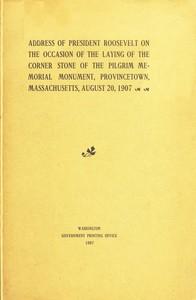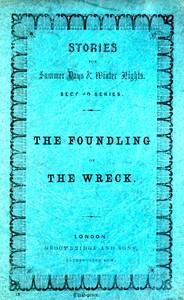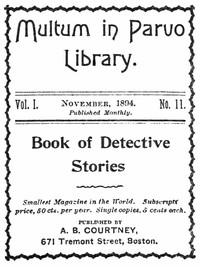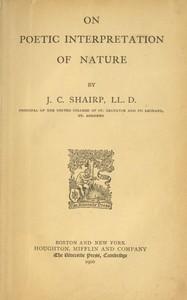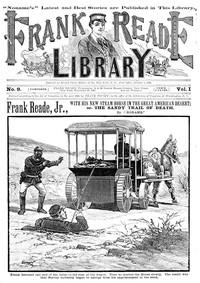|
|
Read this ebook for free! No credit card needed, absolutely nothing to pay.Words: 8357 in 2 pages
This is an ebook sharing website. You can read the uploaded ebooks for free here. No credit cards needed, nothing to pay. If you want to own a digital copy of the ebook, or want to read offline with your favorite ebook-reader, then you can choose to buy and download the ebook.

: Address of President Roosevelt on the Occasion of the Laying of the Corner Stone of the Pilgrim Memorial Monument Provincetown Massachusetts August 20 1907 by Roosevelt Theodore - Pilgrims (New Plymouth Colony); Speeches addresses etc.; Provincetown (Mass.@FreeBooksThu 08 Jun, 2023 ADDRESS OF PRESIDENT ROOSEVELT ON THE OCCASION OF THE LAYING OF THE CORNER STONE OF THE PILGRIM MEMORIAL MONUMENT, PROVINCETOWN, MASSACHUSETTS, AUGUST 20, 1907
WASHINGTON GOVERNMENT PRINTING OFFICE 1907 It is not too much to say that the event commemorated by the monument which we have come here to dedicate was one of those rare events which can in good faith be called of world importance. The coming hither of the Pilgrim three centuries ago, followed in far larger numbers by his sterner kinsmen, the Puritans, shaped the destinies of this continent, and therefore profoundly affected the destiny of the whole world. Men of other races, the Frenchman and the Spaniard, the Dutchman, the German, the Scotchman, the Irishman, and the Swede, made settlements within what is now the United States, during the colonial period of our history and before the Declaration of Independence; and since then there has been an ever-swelling immigration from Ireland and from the mainland of Europe; but it was the Englishman who settled in Virginia and the Englishman who settled in Massachusetts who did most in shaping the lines of our national development. We can not as a nation be too profoundly grateful for the fact that the Puritan has stamped his influence so deeply on our national life. We need have but scant patience with the men who now rail at the Puritan's faults. They were evident, of course, for it is a quality of strong natures that their failings, like their virtues, should stand out in bold relief; but there is nothing easier than to belittle the great men of the past by dwelling only on the points where they come short of the universally recognized standards of the present. Men must be judged with reference to the age in which they dwell, and the work they have to do. The Puritan's task was to conquer a continent; not merely to overrun it, but to settle it, to till it, to build upon it a high industrial and social life; and, while engaged in the rough work of taming the shaggy wilderness, at that very time also to lay deep the immovable foundations of our whole American system of civil, political, and religious liberty achieved through the orderly process of law. This was the work allotted him to do; this is the work he did; and only a master spirit among men could have done it. We have traveled far since his day. That liberty of conscience which he demanded for himself, we now realize must be as freely accorded to others as it is resolutely insisted upon for ourselves. The splendid qualities which he left to his children, we other Americans who are not of Puritan blood also claim as our heritage. You, sons of the Puritans, and we, who are descended from races whom the Puritans would have deemed alien--we are all Americans together. We all feel the same pride in the genesis, in the history, of our people; and therefore this shrine of Puritanism is one at which we all gather to pay homage, no matter from what country our ancestors sprang. We have gained some things that the Puritan had not--we of this generation, we of the twentieth century, here in this great Republic; but we are also in danger of losing certain things which the Puritan had and which we can by no manner of means afford to lose. We have gained a joy of living which he had not, and which it is a good thing for every people to have and to develop. Let us see to it that we do not lose what is more important still; that we do not lose the Puritan's iron sense of duty, his unbending, unflinching will to do the right as it was given him to see the right. It is a good thing that life should gain in sweetness, but only provided that it does not lose in strength. Ease and rest and pleasure are good things, but only if they come as the reward of work well done, of a good fight well won, of strong effort resolutely made and crowned by high achievement. The life of mere pleasure, of mere effortless ease, is as ignoble for a nation as for an individual. The man is but a poor father who teaches his sons that ease and pleasure should be their chief objects in life; the woman who is a mere petted toy, incapable of serious purpose, shrinking from effort and duty, is more pitiable than the veriest overworked drudge. So he is but a poor leader of the people, but a poor national adviser, who seeks to make the nation in any way subordinate effort to ease, who would teach the people not to prize as the greatest blessing the chance to do any work, no matter how hard, if it becomes their duty to do it. To the sons of the Puritans it is almost needless to say that the lesson above all others which Puritanism can teach this nation is the all-importance of the resolute performance of duty. If we are men we will pass by with contemptuous disdain alike the advisers who would seek to lead us into the paths of ignoble ease and those who would teach us to admire successful wrongdoing. Our ideals should be high, and yet they should be capable of achievement in practical fashion; and we are as little to be excused if we permit our ideals to be tainted with what is sordid and mean and base, as if we allow our power of achievement to atrophy and become either incapable of effort or capable only of such fantastic effort as to accomplish nothing of permanent good. The true doctrine to preach to this nation, as to the individuals composing this nation, is not the life of ease, but the life of effort. If it were in my power to promise the people of this land anything, I would not promise them pleasure. I would promise them that stern happiness which comes from the sense of having done in practical fashion a difficult work which was worth doing. The Puritan owed his extraordinary success in subduing this continent and making it the foundation for a social life of ordered liberty primarily to the fact that he combined in a very remarkable degree both the power of individual initiative, of individual self-help, and the power of acting in combination with his fellows; and that furthermore he joined to a high heart that shrewd common sense which saves a man from the besetting sins of the visionary and the doctrinaire. He was stout hearted and hard headed. He had lofty purposes, but he had practical good sense, too. He could hold his own in the rough workaday world without clamorous insistence upon being helped by others, and yet he could combine with others whenever it became necessary to do a job which could not be as well done by any one man individually. These were the qualities which enabled him to do his work, and they are the very qualities which we must show in doing our work to-day. There is no use in our coming here to pay homage to the men who founded this nation unless we first of all come in the spirit of trying to do our work to-day as they did their work in the yesterdays that have vanished. The problems shift from generation to generation, but the spirit in which they must be approached, if they are to be successfully solved, remains ever the same. The Puritan tamed the wilderness, and built up a free government on the stump-dotted clearings amid the primeval forest. His descendants must try to shape the life of our complex industrial civilization by new devices, by new methods, so as to achieve in the end the same results of justice and fair dealing toward all. He cast aside nothing old merely for the sake of innovation, yet he did not hesitate to adopt anything new that would save his purpose. When he planted his commonwealths on this rugged coast he faced wholly new conditions and he had to devise new methods of meeting them. So we of to-day face wholly new conditions in our social and industrial life. We should certainly not adopt any new scheme for grappling with them merely because it is new and untried; but we can not afford to shrink from grappling with them because they can only be grappled with by some new scheme. The utterly changed conditions of our national life necessitate changes in certain of our laws, of our governmental methods. Our federal system of government is based upon the theory of leaving to each community, to each State, the control over those things which affect only its own members and which the people of the locality themselves can best grapple with, while providing for national regulation in those matters which necessarily affect the nation as a whole. It seems to me that such questions as national sovereignty and state's rights need to be treated not empirically or academically, but from the standpoint of the interests of the people as a whole. National sovereignty is to be upheld in so far as it means the sovereignty of the people used for the real and ultimate good of the people; and state's rights are to be upheld in so far as they mean the people's rights. Especially is this true in dealing with the relations of the people as a whole to the great corporations which are the distinguishing feature of modern business conditions. Experience has shown that it is necessary to exercise a far more efficient control than at present over the business use of those vast fortunes, chiefly corporate, which are used in interstate business. When the Constitution was created none of the conditions of modern business existed. They are wholly new and we must create new agencies to deal effectively with them. There is no objection in the minds of this people to any man's earning any amount of money if he does it honestly and fairly, if he gets it as the result of special skill and enterprise, as a reward of ample service actually rendered. But there is a growing determination that no man shall amass a great fortune by special privilege, by chicanery and wrongdoing, so far as it is in the power of legislation to prevent; and that a fortune, however amassed, shall not have a business use that is antisocial. Most large corporations do a business that is not confined to any one State. Experience has shown that the effort to control these corporations by mere State action can not produce wholesome results. In most cases such effort fails to correct the real abuses of which the corporation is or may be guilty; while in other cases the effort is apt to cause either hardship to the corporation itself, or else hardship to neighboring States which have not tried to grapple with the problem in the same manner; and of course we must be as scrupulous to safeguard the rights of the corporations as to exact from them in return a full measure of justice to the public. I believe in a national incorporation law for corporations engaged in interstate business. I believe, furthermore, that the need for action is most pressing as regards those corporations which, because they are common carriers, exercise a quasi-public function; and which can be completely controlled, in all respects by the Federal Government, by the exercise of the power conferred under the interstate-commerce clause, and, if necessary, under the post-road clause, of the Constitution. During the last few years we have taken marked strides in advance along the road of proper regulation of these railroad corporations; but we must not stop in the work. The National Government should exercise over them a similar supervision and control to that which it exercises over national banks. We can do this only by proceeding farther along the lines marked out by the recent national legislation. In dealing with any totally new set of conditions there must at the outset be hesitation and experiment. Such has been our experience in dealing with the enormous concentration of capital employed in interstate business. Not only the legislatures but the courts and the people need gradually to be educated so that they may see what the real wrongs are and what the real remedies. Almost every big business concern is engaged in interstate commerce, and such a concern must not be allowed by a dexterous shifting of position, as has been too often the case in the past, to escape thereby all responsibility either to State or to nation. The American people became firmly convinced of the need of control over these great aggregations of capital, especially where they had a monopolistic tendency, before they became quite clear as to the proper way of achieving the control. Through their representatives in Congress they tried two remedies, which were to a large degree, at least as interpreted by the courts, contradictory. On the one hand, under the antitrust law the effort was made to prohibit all combination, whether it was or was not hurtful or beneficial to the public. On the other hand, through the interstate-commerce law a beginning was made in exercising such supervision and control over combinations as to prevent their doing anything harmful to the body politic. The first law, the so-called Sherman law, has filled a useful place, for it bridges over the transition period until the American people shall definitely make up its mind that it will exercise over the great corporations that thoroughgoing and radical control which it is certain ultimately to find necessary. The principle of the Sherman law so far as it prohibits combinations which, whether because of their extent or of their character, are harmful to the public must always be preserved. Ultimately, and I hope with reasonable speed, the National Government must pass laws which, while increasing the supervisory and regulatory power of the Government, also permits such useful combinations as are made with absolute openness and as the representatives of the Government may previously approve. But it will not be possible to permit such combinations save as the second stage in a course of proceedings of which the first stage must be the exercise of a far more complete control by the National Government. Free books android app tbrJar TBR JAR Read Free books online gutenberg More posts by @FreeBooks
: The Foundling of the Wreck by Anonymous Whymper Edward Engraver - Christian life Juvenile fiction; Biographical fiction; Conduct of life Juvenile fiction; Children Conduct of life Juvenile fiction; Foundlings Juvenile fiction; Enslaved persons Juvenile fic@FreeBooksThu 08 Jun, 2023

: Book of Detective Stories by Pemmon Frank Editor - Detective and mystery stories American@FreeBooksThu 08 Jun, 2023

: On poetic interpretation of nature by Shairp John Campbell - Poetry History and criticism; Nature in literature@FreeBooksThu 08 Jun, 2023
|
Terms of Use Stock Market News! © gutenberg.org.in2025 All Rights reserved.

